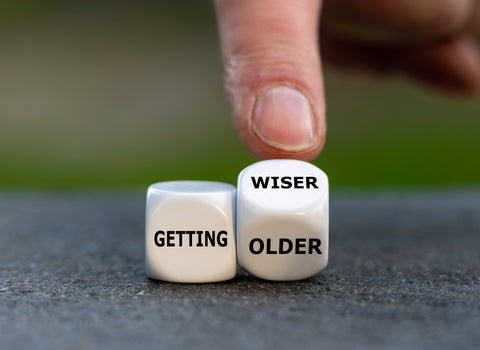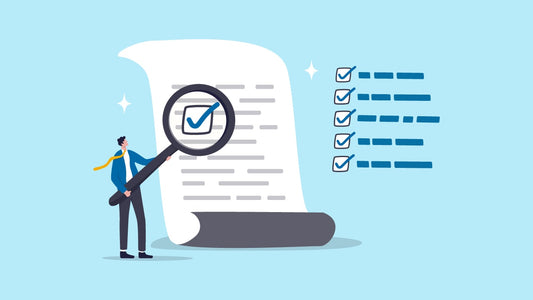Let’s try a quick quiz:
- When standing from a seated position, do you sometimes emit an unexpected groan?
- Was your last bonus mainly spent on home maintenance projects?
- Do you primarily listen to music that’s over a decade old?
- Would you describe your first cell phone as “a brick”?
If you’ve answered mainly yes to these questions - it would be fair to assume that you’re either already part of, or tiptoeing towards an elite group known as ‘The Wise’.
As we age, our brains undergo a remarkable transformation. Scientists have been studying the neuroscience of aging and wisdom for years, and what they've discovered is fascinating.
It’s all true. With age comes wisdom.
It's well documented that our ability to think quickly and recall information peaks in our early 20s and then starts to decline. And while it’s true that some brain processes decline as we age, that’s only part of the story. There is in fact, a lot to be celebrated.
A 2022 study in Germany analyzed data from more than 1.2 million people who took part in an experiment measuring reaction time. Participants were asked to categorize words and images flashing on a screen by hitting the correct key. The results indicated that yes, response times started to slow as early as age 20, but on average, mental speed only started to slow after the age of 60. The study attributed this slowing to increases in ‘decision caution’, rather than differences in mental speed.
Decision caution: As we increase in age, we use experience and knowledge to make decisions.
As our response speeds decline, real wisdom grows.
What is wisdom?
Wisdom is defined as the ability to use knowledge and experience to make sound judgments. As we accumulate more life experience, our brains become better equipped to see the big picture and make decisions based on a broader perspective.
The Role of Experience in Wisdom
One of the hallmarks of wisdom is the ability to use past experiences to inform future decisions. As we gather and store facts and knowledge, our brains can spot patterns and make connections between seemingly unrelated events. This is known as crystallized intelligence. And it starts to peak as we get older.
The Benefits of Aging and Wisdom
Whilst studies have shown that fluid intelligence peaks at 20 and declines with age, we’re discovering there are many different components to fluid intelligence. And each of those components peak at different ages.
So, while it’s true that some brain processes decline as we age, others are just hitting their stride.
Our strategic learning capacity - the ability to sift, assess and prioritize important information, increases with age. As we age, we have greater emotional intelligence, we’re far better equipped to navigate complex social situations. Experience and confidence give us the tools to make sound decisions and maintain emotional balance.
Another benefit is accumulating a supportive social network. Some friends won’t make the cut. But the advantage of more shared experiences with those around us leads to closer and more meaningful relationships. With the right people, we thrive, and this results in a sense of purpose, acceptance and feeling like we belong.
Neuroplasticity and the Aging Brain
One of the most exciting areas of research in relation to the brain and aging is the study of neuroplasticity. Neuroplasticity refers to the brain's ability to change and adapt in response to new experiences. While it was once thought that the brain stopped developing after a certain age, research has found that neuroplasticity can occur throughout our lives.
You’re not stuck with the brain you have.
One way neuroplasticity can be promoted is through engaging in challenging and new activities. It’s not going to be easy - it’s bootcamp for the brain. But it is possible.
What was that about old dogs and new tricks?
Challenge your brain in new ways. Learning a new language, taking up a musical instrument, or trying a new hobby can all stimulate the brain and promote the development of new neural connections. Neurological nodes and networks are formed by using and engaging them.
The nerve cells that fire together, wire together.
In addition, physical exercise has been shown to be beneficial for brain health, as it can increase blood flow to the brain and promote the growth of new neurons.
Another important factor in promoting neuroplasticity is social engagement. Research has found that older adults who are socially engaged have better cognitive function and a lower risk of dementia than those who are socially isolated.
How to Maintain Brain Health
101: Use it or lose it.
Like most long-term partnerships, the key to keeping it fresh is to try something new.
Carrying out the same routine every day won’t promote neuroplasticity.
Here’s 5 ways to maintain your brain:
- Engage in challenging and new activities that stimulate the brain. Learn a language, play an instrument, enroll in a course.
- Stay socially engaged. Volunteer, make plans, get out there. It’s good to talk.
- Exercise regularly. 30-60 minutes a day, 3-4 times a week if possible.
- Eat a healthy diet. Preferably the MIND diet. Combining the Mediterranean diet and the DASH diet, it aims to reduce dementia and cognitive decline.
- Get plenty of sleep. Sleep helps clear abnormal proteins in your brain and consolidates memories which boosts overall memory and brain health.
Finally, know your General Wisdom from your Personal Wisdom.
General wisdom is understanding life from an observer’s point of view (e.g., as an advice giver/commentator). Exercising general wisdom can take over in later life. Those rose-tinted glasses. It’s a coping strategy to self-soothe and stay positive about the lives we’ve lived. We made the right choices; it was for the best. “There was no crime in my day”. That sort of thing.
Personal wisdom is having self-insight. The ability to demonstrate personal growth and understand that priorities and values, including your own, are not absolute. Personal wisdom will keep your brain firing. Objectively reflecting on past experiences. It means taking the time to think about what we've learned, acknowledge our mistakes and shortcomings and apply that knowledge to future situations.
If brain health is important to you, and you’re looking to get ahead of the game. Mind Lab Pro® is a seriously wise move.
Lion's mane mushroom is highly regarded for supporting NGF (nerve growth factor). NGF helps to promote brain plasticity. It stacks especially well with other nootropics (supplements that improve brain health) Citicoline and Phosphatidylserine (PS).
Together these three nootropics supply raw materials, signaling factors and energy that are needed to form new brain pathways. Mind Lab Pro® contains all 3 of these, along with 8 other advanced, natural, premium grade ingredients to support plasticity, memory, recall, learning, and mental processing. Research backed, scientifically proven and with no nasty additives.
[blog-cta]


